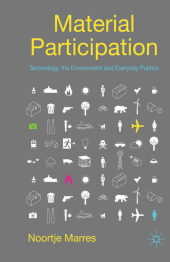 Neuerscheinungen 2012Stand: 2020-01-07 |
Schnellsuche
ISBN/Stichwort/Autor
|
Herderstraße 10
10625 Berlin
Tel.: 030 315 714 16
Fax 030 315 714 14
info@buchspektrum.de |

N. Marres
Material Participation: Technology, the Environment and Everyday Publics
1st ed. 2012. 2012. x, 206 S. 216 mm
Verlag/Jahr: SPRINGER PALGRAVE MACMILLAN; PALGRAVE MACMILLAN UK 2012
ISBN: 1-349-31249-5 (1349312495)
Neue ISBN: 978-1-349-31249-8 (9781349312498)
Preis und Lieferzeit: Bitte klicken
This book develops a fresh perspective on everyday forms of engagement, one that foregrounds the role of objects, technologies and settings in democracy. Examining a range of devices, from smart meters to eco-homes, the book sets out new concepts and methods for analyzing the relations between participation, innovation and the environment.
List of Figures Acknowledgements Preface Objects of Participation The (Dis)invention of the Material Public: Returns to American Pragmatism Devising Engagement: Everyday Carbon Accounting and the Cost of Involvement Living Experiments: A ´Coming Out´ for the Politics of Things The Ecohome as Multifarious Instrument: Engagement, Innovation, Change Re-distributing Problems of Participation Notes Bibliography Index
"[A] rich and stimulating book.´´ - Journal of Cultural Economy
"Marres´ attention to the material conditions of political participation is not a return to materialism but a deep redefinition of each of those terms: why does politics matter and what does it mean to be involved into politics? Before her a pragmatist view of politics and publics remained abstract, without a clear method to follow the objects, pragmata, that give relevance to the creation of the public. Marres´ work deeply renews what it is for the study of politics and participation to take material conditions seriously." - Bruno Latour, Professor, Sciences Po, Paris, France
"Material Participation is a book about the role of objects in political participation. It is part of what has been called the object turn what Noortje Marres, more delightfully, calls the coming out of things. It is an account of how moral and political phenomena may unfold on the plane of things. It deploys a vocabulary of modality, multi-valence, implication, accomplishment, setting and relevance to make visible the middling work of objects. And in doing so offers us the possibility of taking part in a politics of co-articulation, of producing new, more variable kinds of connections between publics, ontology, and the empirical." - Celia Lury, Professor, Centre for Interdisciplinary Methodologies, University of Warwick, UK
NOORTJE MARRES Lecturer in Sociology at Goldsmiths, University of London, UK. Previously she was a Research Fellow in the Institute for Science, Innovation and Society at the University of Oxford, UK.


